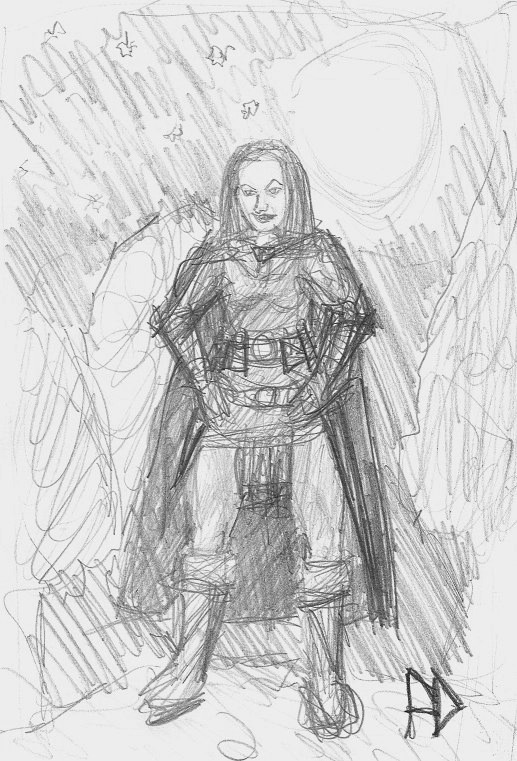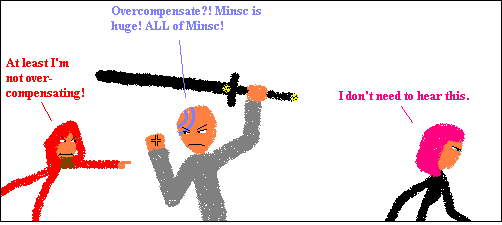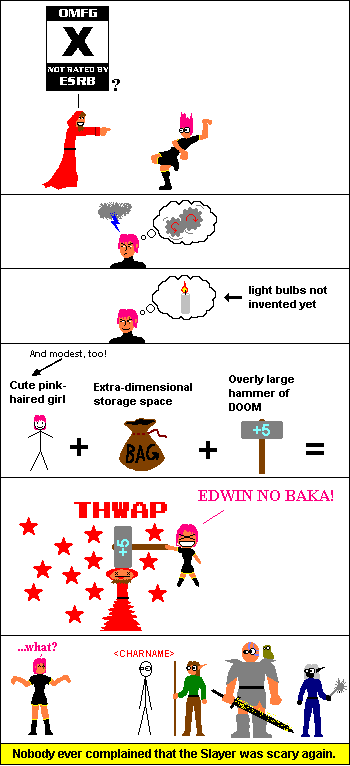Vilkacis -> the second one is scary XDDDDDDDDDDDDDDDDDDDDDDDDDDDDDDDDDDDDDDDDD
What does "no baka" mean  ?
?
I think the literal translation would be "of stupid" - "you're an idiot", pretty much. 
The phrase is, along with the hitting-people-with-a-big-hammer-that-came-out-of-nowhere bit, is an old cliché from Japanese comics.
[edit] Argh, or wait, is it the other way around?  It's been ages since I even thought about learning Japanese. I think in order to get "X of Y" you would need to say "Y no X". Which means it would be "Stupid of Edwin"? Nuts. Brane not werk so gud.
It's been ages since I even thought about learning Japanese. I think in order to get "X of Y" you would need to say "Y no X". Which means it would be "Stupid of Edwin"? Nuts. Brane not werk so gud.
Foolish is a better translation. Stupid is too strong of word I think.
It sounds more natural to use just Baka. Actually using japanese looks really out of place with your story. It is fun to read but would be better without any japanese.
Here is a quick 3 minute lesson. Note if your computer gets strange symbols that's because it should be showing Japanese characters and you don't have a program installed to read them.
The Particle "No"
Possessive Marker
"No" indicates ownership or attribution. It is similar to the English "apostrophe s ('s). "
Kore wa watashi no hon desu.
これは私の本です。 This is my book.
Watashi no ane wa Tokyo
ni sunde imasu.
私の姉は東京に住んでいます。 My sister lives in Tokyo.
Particles are probably one of the most difficult and confusing aspects of Japanese sentences. A particle (joshi) is a word that shows the relationship of a word, a phrase, or a clause to the rest of the sentence. Some particles have English equivalents. Others have functions similar to English prepositions, but since they always follow the word or words they mark, they are post-positions. There are also particles that have a peculiar usage which is not found in English. Most particles are multi-functional.
The final noun can be omitted if it is clear to both speaker and listener.
Are wa watashi no
(kuruma) desu.あれは私の(車)です。 That is mine (my car).
Noun Modification
The noun before "no" modifies the noun after "no". This usage is similar to the possessive, but it is seen more with compound nouns or noun phrases. (e.g. kono hon no chosha -> the author of this book)
Nihongo no jugyou wa tanoshii desu.
日本語の授業は楽しいです。 The Japanese class is interesting.
Bijutsu no hon o sagashite imasu.
美術の本を探しています。 I am looking for a book on fine arts.
"No" can be used many times in one sentence. In this usage the order of nouns in Japanese is the reverse of the English structure. The normal Japanese order is from large to small, or general to specific.
Osaka daigaku no nihongo no sensei
大阪大学の日本語の先生 a teacher of Japanese
at Osaka university yooroppa no kuni no namae
ヨーロッパの国の名前 the names of the countries in Europe
Apposition
"No" links the noun to the appositive that follows.
Tomodachi no Keiko-san desu.
友達の恵子さんです。 This is my friend, Keiko.
Bengoshi no Tanaka-san wa itsumo isogashisou da.
弁護士の田中さんはいつも忙しそうだ。 The lawyer,
Mr. Tanaka seems to be busy all the time.
Topic Marker and Subject Marker
Roughly speaking, "wa" is a topic marker, and "ga" is a subject marker. The topic is often the same as the subject, but not necessary. The topic can be anything that a speaker wants to talk about (It can be an object, location or any other grammatical element). In this sense, it is similar to the English expressions, "As for ~" or "Speaking of ~."
Watashi wa gakusei desu.
私は学生です。 I am a student.
Nihongo wa omoshiroi desu.
日本語は面白いです。 Japanese is interesting.
(Speaking of Japanese, it is interesting.)
If you use Wa, you need to learn Ga.
Ga and Wa
"Wa" is used to mark something that has already been introduced into the conversation, or is familiar with both a speaker and a listener. (proper nouns, genetic names etc.) "Ga" is used when a situation or happening is just noticed or newly introduced. See the following example.
Mukashi mukashi, ojii-san ga sunde imashita. Ojii-san wa totemo shinsetsu deshita.
昔々、おじいさんが住んでいました。
おじいさんはとても親切でした。 Once upon a time, there lived an old man. He was very kind.
In the first sentence, "ojii-san" is introduced for the first time. It is the subject, not the topic. The second sentence describes about "ojii-san" that is previously mentioned. "Ojii-san" is now the topic, and is marked with "wa" instead of "ga."
Wa as Contrast
Beside being a topic marker, "wa" is used to show contrast or to emphasize the subject.
Biiru wa nomimasu ga, wain wa nomimasen.
ビールは飲みますが、
ワインは飲みません。 I drink beer, but I don't drink wine.
The thing being contrasted may or may not stated, but with this usage, the contrast is implied.
Ano hon wa yomimasen deshita.
あの本は読みませんでした。 I didn't read that book
(though I read this one).
Particles such as "
ni(に)," "de(で)," "kara(から)" and "made(まで)" can be combined with "wa" (double particles) to show contrast.
Osaka
ni wa ikimashita ga, Kyoto
ni wa ikimasen deshita.
大阪には行きましたが、
京都には行きませんでした。 I went to Osaka, but I didn't go to Kyoto.
Koko de wa tabako o suwanaide kudasai.
ここではタバコを
吸わないでください。 Please don't smoke here(but you may smoke there).
Whether "wa" indicates a topic or a contrast, it depends on the context or the intonation.
Ga as Emphasis
"Ga" is used for emphasis, to distinguish a person or thing from all others. If a topic is marked with "wa," the comment is the most important part of the sentence. On the other hand, if a subject is marked with "ga," the subject is the most important part of the sentence. In English, these differences are sometimes expressed in tone of voice. Compare these sentences.
Taro wa gakkou
ni ikimashita.
太郎は学校に行きました。 Taro went to school.
Taro ga gakkou
ni ikimashita.
太郎が学校に行きました。 Taro is the one
who went to school.
Ga in a Special Circumstance
The object of the sentence is usually marked by the particle "o," but some verbs and adjectives (expressing like/dislike, desire, potential, necessity, fear, envy etc.) take "ga" instead of "o."
Kuruma ga hoshii desu.
車が欲しいです。 I want a car.
Nihongo ga wakarimasu.
日本語が分かります。 I understand Japanese.
Ga in Subordinate Clauses
The subject of a subordinate clause normally takes "ga" to show that the subjects of the subordinate and main clauses are different.
Watashi wa Mika ga kekkon shita koto o shiranakatta.
私は美香が結婚した
ことを知らなかった。 I didn't know that Mika got married.
Review
Now let's review the rules about "wa" and "ga."
wa は
* Topic marker
* Contrast
ga が
* Subject marker
* With question words
* Emphasize
* Instead of "o"
* In subordinate clauses
Edited by leahnkain, 17 July 2007 - 06:49 PM.























